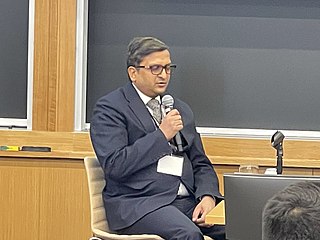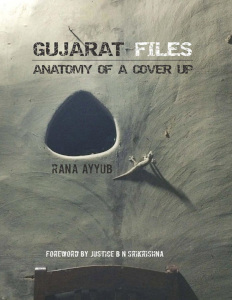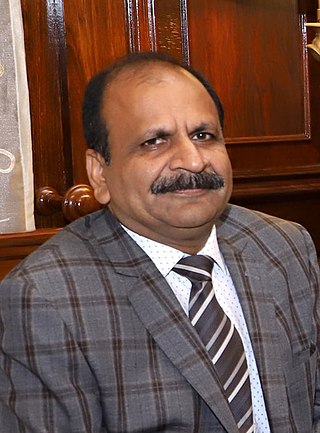Related Research Articles

Teesta Setalvad is a controversial Indian civil rights activist and journalist. She is the secretary of Citizens for Justice and Peace (CJP), an organisation formed to advocate for the victims of 2002 Gujarat riots.

The 2002 Gujarat riots, also known as the 2002 Gujarat violence or the Gujarat pogrom, was a three-day period of inter-communal violence in the western Indian state of Gujarat. The burning of a train in Godhra on 27 February 2002, which caused the deaths of 58 Hindu pilgrims and karsevaks returning from Ayodhya, is cited as having instigated the violence. Following the initial riot incidents, there were further outbreaks of violence in Ahmedabad for three months; statewide, there were further outbreaks of violence against the minority Muslim population of Gujarat for the next year.
The Sohrabuddin Sheikh encounter case is a criminal case in the Gujarat state after the death of Sohrabuddin Anwarhussain Sheikh on November 26, 2005. A special CBI court acquitted all the 22 accused in the case in the alleged fake encounter of Sohrabuddin Sheikh and his wife.
P. B. Sawant was an Indian judge of the Supreme Court of India.
R.B. Sreekumar is a former Gujarat State Director-General of Police.

The Gulbarg Society massacre took place on 28 February 2002, during the 2002 Gujarat riots, when a crowd started stone pelting the Gulbarg Society, a Muslim neighbourhood in the eastern part of Chamanpura, Ahmedabad in the Indian state of Gujarat. Most of the houses were burnt, and at least 35 victims, including a former Congress Member of Parliament, Ehsan Jafri, were burnt alive, while 31 others went missing after the incident, later presumed dead, bringing the total deaths to 69.

Amitbhai Anilchandra Shah is an Indian politician who is currently serving as the 32nd Minister of Home Affairs since May 2019 and the 1st Minister of Co-operation since July 2021. He is also the member of parliament (MP) for Gandhinagar. He served as the 10th president of the Bharatiya Janata Party (BJP) from 2014 to 2020. He has also served as chairman of the National Democratic Alliance (NDA) since 2014. He had been elected as a member of the upper house of parliament, Rajya Sabha, from Gujarat from 2017 to 2019.
Sanjiv Bhatt is a former Indian Police Service officer of the Gujarat-cadre. He is known for his role in filing an affidavit in the Supreme Court of India against the then Chief Minister of Gujarat, Narendra Modi, concerning Modi's alleged role in the 2002 Gujarat riots. He claimed to have attended a meeting, during which Modi allegedly asked top police officials to let Hindus vent their anger against the Muslims. However, the Special Investigation Team appointed by the Supreme Court of India concluded that Bhatt did not attend any such meeting, and dismissed his allegations.
Hosbet Suresh was a judge of the Bombay High Court who led a number of commissions that investigated violations of human rights.

The Naroda Patiya massacre took place on 28 February 2002 at Naroda, in Ahmedabad, India, during the 2002 Gujarat riots. 97 Muslims were killed by a mob of approximately 5,000 people, organised by the Bajrang Dal, a wing of the Vishva Hindu Parishad, and allegedly supported by the Bharatiya Janata Party which was in power in the Gujarat State Government. The massacre at Naroda occurred during the bandh (strike) called by Vishwa Hindu Parishad a day after the Godhra train burning. The riot lasted over 10 hours, during which the mob plundered, stabbed, sexually assaulted, gang-raped and burnt people individually and in groups. After the conflict, a curfew was imposed in the state and Indian Army troops were called in to contain further violence.
Dhananjay Vanzara, popularly known as D. G. Vanzara, is the former Inspector-General of Police (IG) from Gujarat, India. He was in judicial custody from 2007 until his bail in 2015 on charges of having conducted a series of extrajudicial killings, while heading the Anti-Terrorist Squad (ATS). He was acquitted in Sohrabuddin case in 2017.
The Nanavati-Mehta Commission is the commission of inquiry appointed by the government of Gujarat to probe the Godhra train burning incident of 27 February 2002. Its mandate was later enlarged to include the investigation of the 2002 Gujarat riots. It was appointed on 6 March 2002, with K. G. Shah, a retired Gujarat High Court judge, as its only member. It was later re-constituted to include G. T. Nanavati, a retired judge of the Supreme Court of India, after protests from human rights organizations over Shah's closeness to then-Gujarat Chief Minister Narendra Modi. Akshay H. Mehta, retired judge of the Gujarat High Court, replaced Shah when the latter died before the submission of the commission's interim report.
Maninagar is one of the 182 Legislative Assembly constituencies of Gujarat state in India. It is part of Ahmedabad district and is one of the 7 assembly constituencies which make up Ahmedabad West Lok Sabha seat.
Tulsiram Prajapati was a man, who was killed while in custody at 5 am on 26 December 2005. The case is widely believed to have been an encounter killing by the Gujarat Police. DIG D.G. Vanzara has been in jail for seven years, on charges of having organised this encounter, among others.
Jaideep Patel is a medical doctor who runs a pathology lab in Naroda, Ahmedabad, Gujarat in India. He served as the Gujarat state general secretary for Vishwa Hindu Parishad (VHP), a Hindu nationalist organisation, during the 2002 Gujarat riots.

Dr. Vipul Aggarwal is a 2001 batch Indian Police Service (IPS) officer from the Gujarat cadre. He has been appointed as the Principal Commissioner of the Delhi Development Authority (DDA) in March 2024. Before this new role, he served as the Joint Secretary in the Department of Health & Family Welfare. Prior to this, he also served as the Deputy CEO of the National Health Authority, a government agency responsible for implementing healthcare schemes in India, from February 2020 to August 2022. During his tenure, he played a pivotal role in the policy formulation and implementation of the world's largest health assurance scheme, Ayushman Bharat Pradhan Mantri Jan Arogya Yojana, which provided coverage to an estimated 540 million Indian citizens.

Gujarat Files: Anatomy of a Cover Up is a journalistic book about the 2002 Gujarat riots authored and self-published by Rana Ayyub. The book is dedicated to Shahid Azmi along with advocate and activist Mukul Sinha. The foreword of the book is authored by Justice B. N. Srikrishna.

Yogesh Chander Modi is the former Director-General/Chief of the National Investigation Agency (NIA) of India. A retired 1984 batch officer of the Assam-Meghalaya cadre, Y.C. Modi has over 33 years of experience in the Indian Police Service (IPS). He served as Director-General of the NIA from October 30, 2017 and hold this position till his superannuation on May 31, 2021. The Director-General is highest ranking agency executive in the NIA appointed by central/federal government of India, and Y.C. Modi is the 4th person to hold this post after Radha Vinod Raju, SC Sinha and Sharad Kumar.
Rajnish Rai was a Deputy inspector general of police for the Indian Police Service. He began service after graduating with the 1992 cadre. In 2019 he joined the Indian Institute of Management Ahmedabad as an assistant professor.
Ashish Pandya is a Dy.SP in the Indian Police Service, in the state of Gujarat. He came to prominence in the media as the leader of the police force accused of a encounter in the Tulsiram Prajapati killing.
References
- ↑ Subrahmaniam, Vidya (5 January 2012). "Haren Pandya's wife says he could not have been shot in his car". The Hindu. Chennai, India.
- ↑ "The Emperor Uncrowned | the Caravan - A Journal of Politics and Culture". Archived from the original on 1 October 2013. Retrieved 4 June 2013.
- ↑ "Keshubhai man Haren Pandya quits Modi govt". Times of India. 6 August 2002. Archived from the original on 30 December 2014. Retrieved 30 December 2014.
- ↑ "Haren Pandya to campaign for BJP in Gujarat". 1 December 2002. Archived from the original on 30 December 2014. Retrieved 30 December 2014.
- ↑ "Denying ticket to Pandya was unjust: Advani". Times of India. 7 April 2003. Archived from the original on 30 December 2014. Retrieved 30 December 2014.
- ↑ "Haren Pandya's wife to contest Gujarat polls on Keshubhai's party ticket". India Today. 29 November 2012. Retrieved 9 September 2019.
- ↑ "Pandya wife accepts post". www.telegraphindia.com. Retrieved 16 July 2022.
- ↑ "Who killed Haren Pandya?". The Times Of India.
- 1 2 "Supreme Court Judgement on Haren Pandya's death" (PDF). Supreme Court of India.
- 1 2 3 "A Midnight Meeting On Feb 27 And A Murdered Minister". Outlook. 12 November 2007. Retrieved 19 September 2016.
- 1 2 3 "Did SIT ignore Haren Pandya testimony?". Hindustan Times. 21 February 2012. Retrieved 19 September 2016.
- ↑ Jose, Vinod K (March 2012). "The Emperor Uncrowned : The rise of Narendra Modi". Caravan magazine. Archived from the original on 1 October 2013. Retrieved 20 September 2016.
- ↑ "SIT report (Page 195,206,217)" (PDF). Supreme Court of India.
- ↑ Bunsha, Dionne (12–25 April 2003). "An ex-Minister's murder". Frontline. Retrieved 30 December 2014.
- ↑ "Pandya murder: Call records belie Bhatt claims, says SIT - Indian Express". archive.indianexpress.com. Retrieved 9 September 2019.
- ↑ Haren Pandya murder: HC acquits all accused, Zeenews, 29 August 2011
- ↑ Haren Pandya murder case: Gujarat HC acquits all accused, Times Of India, 29 August 2011
- ↑ Sarim Naved (17 September 2011). "The Haren Pandya Judgment: Dissection of a Botched Investigation". Economic and Political Weekly, Vol - XLVI No. 38. Retrieved 30 September 2013.
- ↑ "Haren Pandya murder case: SC convicts 12 persons for killing ex-Gujarat home minister". India Today. 5 July 2019. Retrieved 9 September 2019.
- ↑ "Haren Pandya murder: SC convicts 12 people acquitted by Gujarat HC". The Indian Express. 6 July 2019. Retrieved 9 September 2019.
- ↑ "SC restores conviction of 12 people for Haren Pandya's murder". hindustantimes.com. 5 July 2019. Retrieved 9 September 2019.
- ↑ Sharma, Prathma (5 July 2019). "SC convicts 12 people in Haren Pandya murder case". livemint.com. Retrieved 9 September 2019.
- ↑ ^The Hindu , July 2019 "SC refused plea in Haren pandya murder case"
- ↑ fined 50,000 on NGO Archived 11 August 2019 at the Wayback Machine 'Firstpost'
- ↑ "Was it Tulsiram Prajapati who killed Haren Pandya?". DNA (newspaper). 30 August 2011. Retrieved 30 September 2013.
- ↑ "Kauser Bi killed, body burnt; Gujarat govt to SC". www.rediff.com. Retrieved 9 February 2021.
- ↑ D. P. Bhattacharya (31 August 2011). "Tulsiram Prajapati killed Haren Pandya, says Sanjiv Bhatt". India Today.
- ↑ By VINOD K JOSE (March 2012). "The Emperor Uncrowned : The rise of Narendra Modi". Caravan magazine. Archived from the original on 1 October 2013. Retrieved 30 September 2013.
- ↑ "DG Vanzara sings about Haren Pandya murder, says it was political conspiracy: CBI". Times of India. 21 September 2013. Retrieved 20 September 2016.
- 1 2 "From Hermitude To Holography". Outlook. 8 April 2013. Retrieved 20 September 2016.